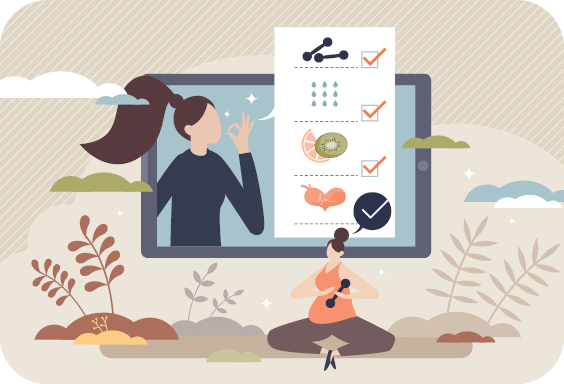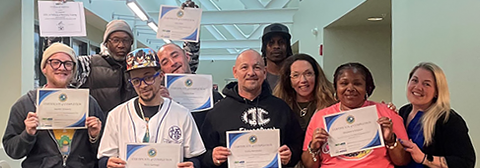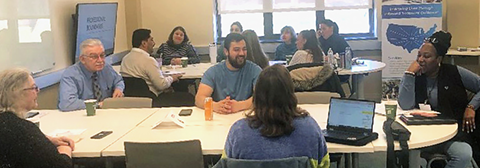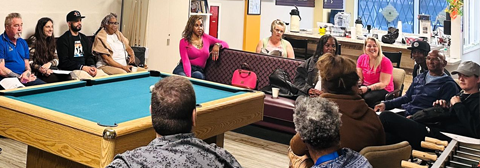Community Health Professionals Training and Resources
All required foundational training, books, exam & application fees, and submission of completed CRPA-P application are included. View the current 2024 schedule for this two-week course here.
GREAT NEWS! We're pleased to announce that course offerings are now open for 2025. Check them out HERE. Follow us on Eventbrite as even more dates become available in 2025!
Monthly workshops, provided by leading experts in the field, hone in on the many facets of recovery. Events are generally three hours long and intended for anyone who works with people struggling with behavioral health. Join us for our upcoming "The Recovery Process Series" by registering here.
These monthly, one-hour workshops are specific to the certified peer, and provide a unique opportunity to network, learn, and share with other Certified Peers. View upcoming CRPA Mini-Workshops here. Workshops are held at Hive of Hope in Albany, NY unless noted otherwise.
Training and Professional Development Resources for Certified Peers
-
Become a Certified Peer
-
Training for Certified Recovery Peer Advocates Initial Certification and Continuing Education
CRPA HCD Professional Development Program Information and Registration
TRAINING - Friends of Recovery - New York (for-ny.org )
Complete list of Foundational Trainings approved by ASAP - New York Certification Board
NYS Certification Board at ASAP Application Information
Training for Certified Mental Health Peer (peer specialist) Initial Certification
CPS HCD Professional Development Program Information
Core Competencies for Peer Workers in Behavioral Health Services (samhsa.gov)
-
Certified Peer Professional Development Resources and Tools
-
Explore skills in the following topics: Cultural Competency and Addressing Stigma, Ethics and Boundaries, Health Equity, Trauma Informed Care, Medicated Assisted Treatment, Recovery Planning, Advocacy, Working with Families, Supporting the Re-entry Population, Drug/Treatment Court Resources, Working with the Unhoused, Peer Role Virtual Support, Peer Integration
Cultural Competency and Addressing Stigma
Drugs-Brains-and-Behavior-The-Science-of-Addiction.pdf - scientific information about substance use disorder, including the many harmful consequences for the brain and the basic approaches that have been developed to prevent and treat the disorder.
Recovery-oriented-language-quick-tips Recovery Oriented Language Tips and Tools
Recovery-Oriented-Language-Guide.pdf Recovery Oriented Language (Complete) Guide
Recovery Planning Language for Documentation A Guide for the Use of Recovery-Oriented Language in Service Planning, Documentation, and Correspondence
Stigma_Humanizing_Campaign_ECHO.pptx (live.com) The impact of stigma and the tools we can use to help avoid stigmatizing actions and words.
Addiction Epidemiology, Language, and Stigma PowerPoint Presentation (MassGeneralHospital) Learn: the roots of addiction and the terminology, language, and stigma that is attached to it
Improving Cultural Competency for Behavioral Health Professionals (HHS OMH) is a free, e-learning program to help behavioral health professionals increase their cultural and linguistic competency offered by the HHS OMH and was collaboratively developed with SAMHSA and other federal and external partners.
Ethics, Confidentiality & Boundaries for Mental Health Workers & Peer Support Specialist (articulateusercontent.com) A Ppt presentation on the role of ethics and codes of conduct, confidentiality, and boundary setting when working as a certified peer professional
Ethical Framework Tip Sheet for Peer Recovery Support Services a tip sheet on the specific code of ethics that the certified peer role subscribes to
NYS Code of Ethical Conduct and Disciplinary Procedures for Peer Specialists handbook for the NYS Code of Ethical and Disciplinary Procedures for Peer Specialists
Boundary Setting for Peers Fostering Resilience in Yourself and Others: Boundary Setting
What is Health Equity? - YouTube a video(3 mins) that explains the role of social, economic, and environmental conditions create health equities
Health and Recovery 1: Kindness, Dignity and Respect a podcast episode with Cheryl Gagne and Steven Samra about what health means to people in recovery. They also share strategies for health care providers to use when supporting people in recovery.
Supporting Black Women's Resilience and Recovery video (60 mins) recording of a Recovery LIVE event
Engaging in Difficult Conversations About Racial Inequity video (60 mins)
Roadmap to Racial Equity in Behavioral Health and Recovery Organizations video (58 mins)
Supporting Recovery for All: Racial Equity in Recovery Support video recording of a BRSS TACS Recovery LIVE! event (60:07 minutes)
Center of Excellence LGBTQ+ Behavioral Health Equity E-Learning Modules providing information on terminology, general identity development, disparities among LGBTQ+ populations across the lifespan, and best practices for behavioral health providers.
Learning About Sexual Orientation, Gender Identity & Expression (SOGIE) (six minutes, 34 seconds)
Intersections of Trauma, Mental Health, and Substance Use a podcast episode
SAMHSA’s Concept of Trauma and Guidance for a Trauma-Informed Approach from the Substance Abuse and Mental Health Services Administration (SAMHSA)
Important Things to Get Right About the “Neurobiology of Trauma” from End Violence Against Women International
Trauma-Informed Care in Behavioral Health Services from SAMHSA, evidence-based and best practice information for behavioral health service providers and administrators who want to work more effectively with people who have been exposed to acute and chronic traumas and/or are at risk of developing traumatic stress reactions. Using key trauma-informed principles, this toolkit addresses trauma-related prevention, intervention, and treatment issues and strategies in behavioral health services.
Bessel van der Kolk: Brain, Mind, and Body in the Healing of Trauma Dr. Bessel van der Kolk, one of the world’s leading experts on developmental trauma, explains how our long-term health and happiness can be compromised by prior exposure to violence, emotional abuse, and other forms of traumatic stress
London Trauma Specialists’ Psychoeducation Video: The Brain Model of Post-Traumatic Stress Disorder (PTSD) a video (5 mins) on how the body and brain respond and remember stress and trauma
Viatcheslav Wlassoff: How Does Post-Traumatic Stress Disorder Change the Brain? an overview of what changes happen in the brain from PTSD
Changing the Conversation: Recognizing Urban Trauma and Supporting Healing (libsyn.com) podcast; Host Kristen Paquette talks with Cheryl Gagne and Steven Samra about what health means to people in recovery. They also share strategies for healthcare providers to use when supporting people in recovery.
Medicated Assisted Treatment MAT
SAMHSA’s Facts about Buprenorphine for Treatment of Opioid Addiction (also available in Cambodian/Khmer, Chinese, Vietnamese, Russian, and Spanish) is a booklet that gives patients information on buprenorphine and medication-assisted treatment for opioid addiction. Also, it describes addiction and withdrawal, how buprenorphine works, its proper use, its side effects, and how it fits with counseling in the recovery process.
Opioid Use Disorder, Medication, and Recovery (58 minutes) – January 26, 2017
https://www.sheriffs.org/publications/Jail-Based-MAT-PPG.pdf Best practices, guidelines, and resources for Jail-based MAT
The Recovery Services Resources And Activities Guide.pdf (healthycapitaldistrict.org) resources and activities that support the multiple pathways to recovery
Recovery Binder: Recovery Coach Resources resources for recovery coaches, including links to William White’s prose, cultural competency, and racial equity sites and articles, as well as the Massachusetts Recovery Coach Hub
Decision in Recovery: Treatment for Opioid Use Disorder A handbook used to learn how to engage people in shared decision-making conversations about accessing evidence-based treatment for their opioid use disorder.
ER-OD Survival Guide Quick access to multiple resources to address challenges that can arise in the emergency room- ie inadequate treatment, discharge planning
CHAMP-Brochure.pdf (ny.gov) CHAMP is designed to help individuals and their families resolve issues in accessing substance use disorder and mental health services. It’s FREE and CONFIDENTIAL. CHAMP is available to everyone, regardless of the type of insurance they have, or even if they are uninsured.
ASAP NYS Policy Center advocacy tools, sample letters to senators and congressmen, and active campaign info
Family to Family Recovery Resource Guide
Including Family and Community in the Recovery Process (2014)
Building Healthy Relationships in Recovery: 10 Tips (2018)
Walking Alongside: Strategies to Support Parenting in Recovery (2021)
Supporting the Re-entry Population (Includes Drug Court Information)
https://www.prainc.com/wp-content/uploads/2020/08/PeersAcrossSim_PRA-508.pdf a two-page tool that provides an overview of how people with lived experience, or peers, can provide support to individuals in contact with the criminal justice system at each intercept of the Sequential Intercept Model.
10 Keys to Prepare Prisoners for Re-entry
The Center for Community Justice (Serves Albany County and Schenectady County)
https://www.scoalbany.com/ Second Chance Opportunities offers recovery and re-entry support and services
Toolkit Resources | National Reentry Resource Center
Peer Support Roles in Criminal Justice Settings (ca.gov)
After Incarceration: A Guide to Helping Women Reenter the Community (samhsa.gov)
Drug/Treatment Court ResourcesVeterans Treatment Court Grant Program
National Drug Court Resource Center
Interactive Map of Drug Courts
Adult Drug Court Training and Technical Assistance
State-based Adult Drug Court Training and Technical Assistance
National Training System for Treatment Court Practitioners
Tribal Healing to Wellness Training and Technical Assistance
Family Drug Courts Training and Technical Assistance
Juvenile Drug Treatment Court Training and Technical Assistance
Homeless Outreach Best Practices and Tools Homeless Outreach Best Practices and Tools
Whole-Person Care for People Experiencing Homelessness & Opioid Use Disorder with the Homeless and Housing Resources Center
What I Needed When I Was Experiencing Homelessness by Steven Samra
- Weekly Recovery Coach Call-In Radio Show → Thursdays, 11-noon; Prior show recordings also available here
- Mental Health Podcasts 11 Mental Health Podcasts
- Recovery Coach University – FB Page posts daily educational articles and blogs
- Virtual Recovery Resources
Peer Integration and stages of change tool kit
Certified Peer Roles and Functions
The Effectiveness of the Certified Recovery Peer Advocates/Recovery Coaches
BRSS-TACS-Integrating-Peer-Support-Workers.pdf
Global-Evidence-for-Peer-Support-HUMANIZING-HEALTH-CARE.pdf (facesandvoicesofrecovery.org)
· HCD Peer Professional Development Series: Videos and tools
Training and Professional Development Resources for Community Health Workers
A Community Health Worker is a frontline health worker and trusted leader who has a unique understanding of the needs of the communities they serve. CHWs are an intermediary between health services, social services, and community members. On behalf of community residents, they advocate for change, build knowledge and self-sufficiency, and increase access to quality and culturally competent services. CHW titles include Patient Navigator, Patient Advocate, Care Coordinator, and Community Ambassador. Explore our collection of professional development resources. We've provided tutorials, resources, and tools for each competency.
-
Training Opportunities
-
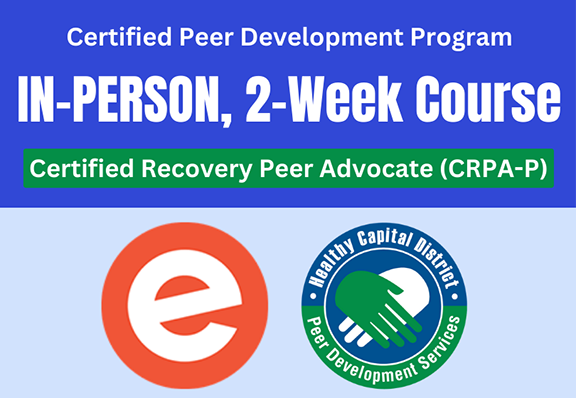 Certified Recovery Peer Advocate Training: Healthy Capital District offers courses for provisional certification for the role of Certified Recovery Peer Advocate (CRPA)! We support you through the entire process and are dedicated to your success!! Unlike other programs, we provide THREE MONTHS of support after course completion! From completing foundational training, MSR, and Ethics, to submitting a completed application, we are here for you! Visit Eventbrite to explore all upcoming course dates and other professional development opportunities.
Certified Recovery Peer Advocate Training: Healthy Capital District offers courses for provisional certification for the role of Certified Recovery Peer Advocate (CRPA)! We support you through the entire process and are dedicated to your success!! Unlike other programs, we provide THREE MONTHS of support after course completion! From completing foundational training, MSR, and Ethics, to submitting a completed application, we are here for you! Visit Eventbrite to explore all upcoming course dates and other professional development opportunities.FREE CHW Training: Offered through Hudson Mohawk Area Health Education Center: This Community Health Worker training provides the necessary theoretical and practical knowledge to address several health needs in the community. Through the training modules, participants will gain the necessary core competencies and knowledge of the communities and populations they support. Click here for more information.
 WNY R-AHEC: Self-guided courses (virtual trainings) that give the learner control and offer continuing education credits. The courses are all either free or $10.
WNY R-AHEC: Self-guided courses (virtual trainings) that give the learner control and offer continuing education credits. The courses are all either free or $10.- Courses offering CC credits:
https://www.r-ahec.org/workforce/continuing-education-credits/ - Completion Certificate Courses (no CC Credits)
https://www.r-ahec.org/workforce/self-guided-courses/ - Instructor-led trainings (Professionalism and Mental Health First Aid):
https://www.r-ahec.org/workforce/instructor-led-trainings/
Public Health Training Opportunities: Training Search | NNPHI (phlearningnavigator.org) This comprehensive site offers the flexibility to select courses by topic, CE credit availability, length, and job task.
NYS Citizen Public Health Leader Training Program: Become a designated NYS Citizen Public Health Leader in your community. The goal of this program is to have at least one citizen public health leader in every neighborhood and community. Leaders will understand the state of health in NY and the factors that influence health. They will have foundational knowledge related to key public health issues and skills to connect and communicate with peers, allies, and key social resources. As a citizen public health leader, you will be able to take an active role in helping your community prevent and rebuild from the effects of COVID-19. Over the longer term, you’ll be a part of an informed network that can be mobilized to share information and plan for prevention, detection, and response in the event of public health emergencies. NYS Citizen Public Health Training Program - eCornell
University of Albany Center for Public Health Continuing Education Programs: View Trainings | PHTC Online (phtc-online.org)
- Courses offering CC credits:
-
Courses and Resources for the CHW Core Competencies
-
Explore skills in the following topics: Stress Management, Time Management, Advocacy Skills, Community Outreach and Engagement, Interpersonal and Communication Skills, Promoting Healthy Lifestyles, Cultural Competency, and Responsiveness, Social Determinants of Health (SDOH) and Service Coordination, Individual and Community Assessment Skills, Health Insurance Basics, Teaching Skills
Tutorials
Stress Management & Family Support Flipchart (nyu.edu) - a “how to” for supporting individuals and families experiencing increased stress
Stress Management Lesson (Self-Guided) - Steps to Leaps - Purdue University - This module (25-45mins) will introduce you to a variety of ways to recognize and cope with stress. Throughout this self-guided module, you will work through action steps to create stress management goals, identify stressors and practice some stress coping skills.
The Messenger Chronicles: Managing Stress and Time | PHTC Online (phtc-online.org) - Learn to recognize the symptoms of stress and the factors that may increase susceptibility to stress. Strategies to manage stress are offered in this scenario-based training. Learners are also given a framework for managing and prioritizing tasks to help minimize "stress-causing" situations. Job aids like the "Project Startup Tool" and the "Urgent/Important Matrix" are provided for learners' use.
Depression Center Toolkit - a toolkit created by the University of Michigan Depression Center
Live Your Life Well (by Mental Health America) - provides the “10 Tools to Living Life Well”
Applying Emotional Intelligence to Recovery (naadac.org)
Tools and Resources
Greater Good Science Center - a research-based collection of articles, practices, and expert opinions on positive practices for well-being
Infographic: A day in the life of a community health worker | CT Health Foundation - infographics depict “a day in the life of a Community Health Worker”
https://www.montefiore.org/healingarts-relaxationtracks - Relaxation Audio Tracks and Hotlines for use and for referrals
https://www.verywellmind.com/tips-to-reduce-stress-3145195 - 18 Effective Stress Relief Strategies on How to Relive Stress Now and in the Future
https://www.rd.com/jokes/ - Reader’s Digest – Jokes, Riddles, and More!
Tutorials
Time Management Lesson - Steps to Leaps - Purdue University - This module will introduce participants to ways they can improve their time management skills by reducing time-wasting behaviors and thinking patterns, and increasing organization. Participants will explore some of the psychological traps that produce ineffective time management and learn tips and tricks that can quickly save time and effort when trying to complete a packed schedule.
Time Management - This module ( 27 mins) shares effective strategies for time management, planning & prioritizing, creating time logs and to-do lists, avoiding time wasters/time robbers, implementing Pareto principle of 80/20, deciding what’s Urgent vs Important, and the difference of busy vs. productive.
How I Manage My Time- 10 Tips - (10 mins) 10 principles and ideas to manage time effectively in daily life.
Tools and Resources
https://www.thebalancesmb.com/time-management-tips-2947336 - quick time management tips to increase productivity and prevent burnout
https://symondsresearch.com/time-management-activities - training course materials to teach time management to clients
28 Free Time Management Worksheets | Smartsheet - multiple time management templates and tools to address personal and professional time management needs
Tutorials
Advocacy101forCHWs - an advocacy training (1.5 hrs.) designed for and by Community Health Workers
https://www.youtube.com/watch?v=EUBuzovlSb8 - a video (1 hr.) on the community health workers' role in health equity
https://digitalmedic.stanford.edu/advocacy-training-community-health-workers - mobile advocacy course designed by Stanford University
Advocacy Toolkit: Skills and Strategies for Effective and Peer Advocacy | BrainLine - This Advocacy Tool Kit is a training tool for people with disabilities, their families, and friends to help build and support strong advocacy skills.
Tools and Resources
Resources – We the Patients (wethepatientsny.org) - "We The Patients" provides tools and resources to engage patients in healthcare advocacy and to create a better healthcare system by working together with community members, activists, unions, nonprofits, policymakers, volunteers, and more.
Community Outreach and Engagement
Tutorials
Making The Connections: Our City, Our Society, Our Health - A terrific overview of community engagement (4 mins)
Partnership Development - partnership development training focused on building capacity - a webinar (1.5 hrs)
Tools and Resources
I am a CHW | RCHWN - a campaign tool aimed to educate community members on the role of the CHW while also providing a platform for CHWs to share their experiences, passions, and resources
Social Identity Worksheet Activity - an exercise in which you map out different aspects of your social identity (i.e., social group membership) and reflect on how these interconnect with one another to shape your life experiences
Community Organizing & Community Change - a video (-15mins) on promoting community change and social activism through community organizing
Interpersonal and Communication Skills
Tutorials
*Motivational Interviewing: An Introduction - a video (~18 minutes) covering the basic concepts of Motivational Interviewing (MI). After a brief definition, topics include the Spirit of MI, The four basic OARS skills, and the "processes" of MI
Healthy Hearts Northwest Webinar 4: Motivational Interviewing on Vimeo - a presentation (45 mins.) on the origins of and evidence behind motivational interviewing, and practical tips on how to use it. Topics include strategies for keeping patients with multiple challenges focused and ways to use confidence levels during motivational interviewing conversations
Motivational Interviewing: Fundamental Skills (OARS) - (Session 2) - Bing video - a webinar (1 hr) focused on Motivational Interviewing and using open questions, affirmations, reflective listening, and summary reflections O.A.R.S
Active Listening: Communication Skill - a one-page overview of what active listening is, and how to demonstrate it
The Messenger Chronicles: Introduction & The Four Cs | PHTC Online (phtc-online.org) - The "Messenger Chronicles: Effective communication strategies for difficult conversations" presents a new framework for communication in difficult situations. This framework shifts focus away from managing "difficult" people towards an understanding of the process of difficult conversations and accepting responsibility for one's own performance. Given realistic situations and real-world conversations, learners will experience communication strategies and practical techniques in context.
Health Literacy Basics | Health Literacy | CDC - an overview and explanation of health literacy and how to explain health literacy to others
Guide for Easy to Understand Materials (cdc.gov) - “Simply Put”, a guide for creating easy-to-understand materials
Tools and Resources
OARS in Motivational Interviewing.pdf (nicic.gov) - a worksheet outlining each of the core motivational skills- open questions, affirmations, reflective responses, and summarizing
Practice Active Listening: Learn How to Listen Attentively (verywellmind.com) - an explanation of Active Listening and tips for implementation
31-How To Listen Worksheet (wisc.edu) - active listening exercises and techniques
Communication Self-Assessment | Agency for Healthcare Research and Quality (ahrq.gov) - a self-assessment worksheet to improve communication skills
Picture This! [National Institutes of Health (NIH) 2021)] - This NIH resource provides suggestions on selecting or developing images (drawings, illustrations, charts, maps, or animations) to accompany your text (or voice-over in the video) to achieve the desired outcome.
Teaching Patients with Low Literacy Skills - This free downloadable book is considered a classic text in health literacy.
Tutorials
Techniques for Effective Patient Self-Management (video, 21 mins)
Patients and Providers Discuss Importance of Asking Questions - In these short videos, patients talk about how simple questions can help you take better care of yourself, feel better, and get the right care at the right time. Doctors and nurses talk about how your questions help them take better care of you and give advice on how you can be an active member of your healthcare team and get your questions answered.
Tools and Resources:
Waiting Room Video (7 mins.) - features patients and clinicians discussing the importance of asking questions at medical visits
My Questions for This Visit - list of questions to bring to a doctor’s visit
Be More Involved In Your Health Care: Tips for Patients - This brochure gives patients tips to use before, during, and after a medical appointment to make sure they get the best possible care.
Question Builder - The Question Builder helps people create a list of questions they can take to appointments if they are getting a checkup, talking about a problem or health condition, getting a prescription, or discussing a medical test or surgery.
Patient Prep Card - This card provides an outline for questions and setting health goals before medical appointments.
Patient Note Sheet - helps people record important information they receive during medical appointments
Next Steps After Your Diagnosis - This page offers general advice for people with almost any disease or condition. And it has tips to help you learn more about your specific problem and how it can be treated.
Research Summaries for Consumers - These free research summaries discuss the benefits and risks of different treatments for different health conditions and are based on comparative effectiveness reviews that cover health topics suggested by the public.
20 Tips to Help Prevent Medical Errors - these tips tell what patients what they can do to get safer care
How to Create a Pill Card - Patients, parents, or anyone who needs to keep track of their medicines can create an easy-to-use "pill card" using the instructions and sample clip art on this page.
Cultural Competence and Responsiveness
Tutorials
Advancing Cultural Competence SUNY Albany Course with Certificate – 12.5 CEs - this course provides cutting-edge cultural competence continuing education through free, self-paced online coursed.
The Colorado Trust: Health Equity and the Social Determinants of Health - video presentation (1.5 hrs.) Dr. Troutman shares insights about how social determinants of health — where people live, learn, work and play -- affect health, and what we can do to address these factors.
Exploring the Connection Between Racial Healing and Health - a webinar(1hr.) exploring the connection between racial healing and health
*Community Engagement & Cultural Competence - Through this self-paced course, community health workers and healthcare professionals will be able to gain a deeper understanding of the functioning of unique and culturally rich communities and serve them better. This training will help you develop a broader skill set to ensure better health for all members of our community.
*Gender Identity and Pronouns (~4 minutes) - a brief video explaining gender identity and pronouns
Learning About Sexual Orientation, Gender Identity & Expression (SOGIE) (six minutes, 34 seconds)
Tools and Resources
What is Health Equity? - Health Equity video, fact sheets, briefs, reports, and infographics
Minority Health Disparity Story: Michelle - a short video (5 mins) from a CHW on addressing health disparities
*Conscious & Unconscious Biases in Health Care, NCCC:: Bias - This course focuses on conscious and unconscious biases in health care and their impact on people who are disproportionately affected by disparities in health and health care. It will offer an array of innovative activities, based on current evidence and best practices, that are intended to diminish the negative impact of biases.
Social Determinants of Health (SDOH) and Service Coordination
Tutorials
10 Minute SDOH Overview - A brief video (10mins) on the factors that interfere with health equity and the ability of patients to get their health care needs met. For patients with complex lives and complex health needs, these challenges are even more pronounced. These social determinants of health, such as income, education, transportation, housing, and race or ethnicity, have a powerful influence on a patient's life long before they arrive at a hospital or clinic.
SDOH Overview - a video (7 mins) explains the foundational impact of structural racism, social determinants of health and their impact on historically marginalized populations, and steps necessary to achieving health equity in affected communities
What are social determinants of health, and how do they impact the health of populations:
*Addressing Social Determinants of Health: Connecting Complex Needs Patients to Community Resources (1.5 hrs.) - This webinar will feature speakers who will share strategies for addressing social determinants of health (SDOH) through screening approaches, innovative technologies that track social service referrals, and development of strong connections with community partners.
Medical College of Wisconsin - a presentation (1 hr.) on the historical basis for health disparities, the impact of social determinants of health, and the merging of health disparities and social determinants of health and how they impact health and health outcomes.
Engaging in Difficult Conversations About Racial Inequity - video recording from YWCA Bucks County (1hr)
Tools and Resources
SDOH and the Capital Region - The United For ALICE Project is a nationwide effort to provide a more accurate picture of financial insecurity at the state, county, and municipal level. It provides a framework, language, and tools to measure and understand the struggles of a population called ALICE — an acronym for Asset Limited, Income Constrained, Employed.
Promoting Health Equity - A Resource to Help Communities Address Social Determinants of Health (cdc.gov)This Promoting Health Equity workbook provides tools to develop, implement, and evaluate interventions that target SDOH.
SDOH and YOU connecting the dots Multiple engaging activities designed to prompt discussion and a thorough understanding of SDOH in order to best support community members
Community_Health_Worker_Care_Coordination Provides models for care coordination in rural communities
Letsgethealthy.ca.gov Reducing Inequities Infographic An infographic demonstrating the public health framework for reducing health inequities by addressing SDOH
Model_Care_Coordination.pdf (kpwashingtonresearch.org) Infographic for the Care Coordination Model
Social-Determinants-of-Health Infographic on the non-clinical factors that influence a person’s health
Engaging in Difficult Conversations About Racial Inequity-- (1 hr) video recording from YWCA Bucks County
Individual and Community Assessment Skills
Tutorials:
Identifying Community Health Needs and Assets- This course is a free CDC TRAIN course but does require setting up a CDC TRAIN account. The course is 45 mins and focuses on identifying communities with unmet/disproportionate health needs, finding what matters to people in the community, and describing the resources available for addressing the identified issues.
Conducting Community Health Assessments - At the end of this 45-minute online course, learners will be able to: define community health assessment, define the geographic boundaries of an assessment, and compile and describe evidence about local needs.
Personal Health Inventory Personal Health Inventory - a screening tool developed by the US Dept of Veteran Affairs that can be used with any adult population to assess health and well-being.
Developmental Screening - The Basics and How to Score: PHQ-2 & PHQ-9 - Bing video (7 mins) - The PHQ-2, comprising the first 2 items of the PHQ-9, inquires about the degree to which an individual has experienced depressed mood and anhedonia over the past two weeks. Its purpose is not to establish final diagnosis or to monitor depression severity, but rather to screen for depression. Patients who screen positive should be further evaluated with the PHQ-9 to determine whether they meet criteria for a depressive disorder.
Tools and Resources
Community Health Tools
Community Inventory - tool and worksheet for identifying community resources and what they offer
https://www.cdc.gov/chinav/docs/chi_nav_infographic.pdf - fantastic infographic on the 4 considerations to Improve Health and Well-Being for All
Health Screenings
Personal-Health-Inventory.pdf (uwhealth.org)- Customizable Personal Health Inventory Worksheet
Administering the Patient Health Questionnaires 2 and 9 (PHQ 2 and 9) in Integrated Care Settings (ny.gov)- a resource page from NYS Dept of Health for the PHQ2 and PHQ-9 Questionnaires
Patient Health Questionnaires - mental health and substance use disorder screening tools
SBIRT: Screening, Brief Intervention, and Referral to Treatment (SBIRT) is an evidence-based approach to identifying patients who use alcohol and other drugs at risky levels. The goal of SBIRT is to reduce and prevent related health consequences, disease, accidents, and injuries Below is a list of pre-screens, also known as a brief screen, which is defined by SAMHSA as "a rapid, proactive procedure to identify individuals who may have a condition or be at risk for a condition before obvious manifestations occur." (expando with below) Commonly used Pre-screening tools:
AUDIT-C - consists of three questions related to drinking frequency and quantity. The higher the score, the more likely alcohol is affecting the individual’s health and safety. Audit-C questions are a subset of the full 10-question Audit
AUDIT-C in Spanish | Full 10-question Audit in Spanish
NIDA Quick Screen - pre-screen that assesses the use of alcohol, tobacco, and prescription drugs for non-medical reasons and use of illegal drugs during the last year
DAST 1: A one-item screening tool for the past year's use of substances not including alcohol
Four Ps- pre-screen for prenatal substance use
Tutorials
Making healthcare decisions isn't always easy. Establishing a healthcare team and keeping your information organized can help you find the right care when you need it. These tools can help: https://www.healthycapitaldistrict.org/index.php?module=Tiles&controller=index&action=display&id=101046025653507357
Navigating uninsured patients through health care - Community health workers play a vital role in their communities, with the potential to improve health outcomes and reduce costs. Read this impactful story on how Jacqueline Sanchez, a CHW, helps clients who have urgent medical needs and no health insurance
Video: Health Insurance: How Do I Get It, Pay for It and Use It? (31 minutes)
Video: What Immigrants and Refugees Need to Know about Health Coverage (23 minutes)
Tools and Resources:
Medicaid - OCHIA (nyc.gov) - a comprehensive overview of Medicaid eligibility, application requirements, and more
Essential-Plan-Fact-Sheet.pdf (lehman.edu) - PDF overview of the Essential Plan, enrollment guidelines, and resources for enrollment
Tutorials
The CHW FlipCharts are two-way visual aids designed to help CHWs provide brief educational instruction to community members on a variety of health and wellness topics. These resources can help keep the discussion on track and provide the participant with basic visuals and messages to reinforce the discussion. (expando with the below)
Diabetes 101 FlipChart:- Myths and Facts about Diabetes; Glucose and Insulin; What Is Diabetes?; Type 1 versus Type 2 Diabetes; Risk Factors for Diabetes; Hypoglycemia and Hyperglycemia; Taking Care of Your Diabetes Every Day; Monitoring Your Diabetes; Know Your Numbers
Diabetes Complications FlipChart: Effects of Diabetes; Nerve Health; Eye Health; Oral Health; Heart Health; Kidney Health; Footcare; Who Is on Your Care Team?
Hypertension 101 FlipChart:Topics: What Is Blood Pressure?; What Is Hypertension?; Heart Disease Risk Factors; Taking Care of Your Heart Every Day; Make Control Your Goal; Monitoring Your Blood Pressure; Know Your ABCs
Hypertension 201 FlipChart:Topics: Basics of Cholesterol; LDL and HDL; Total Cholesterol; Triglycerides; Heart-Healthy Diet; Heart Attack Basics; Know the Warning Signs; Stroke Risk and Warning Signs; Make a Plan: Talking to Your Family and Friends
Nutrition FlipChart:Topics: Energy In versus Energy Out; Plate Method for Portion Control; Understanding a Nutrition Facts Label; Avoiding Fat, Cholesterol, and Sodium; Barriers to Healthy Eating; Making Healthy Choices when Eating Out; Shopping on a Budget; Health Food Shopping in the Neighborhood
Physical Activity FlipChart:Topics: What Is Physical Activity?; Myths and Facts about Physical Activity; Why Is Being Active so Important?; How Much Physical Activity Do I Need?; What Activities Can I Do?; How to Prepare Myself to Do Regular Physical Activity; How Do I Stay Consistent?; Staying on Track with a Buddy
Smoking and Your Health FlipChart:Topics: Types of Cigarettes: Know the Facts; How Does Smoking Affect Your Health?; Health Benefits of Quitting; Smoking and Your Wallet; Secondhand Smoke; Creating a Quit Plan; Dealing with Triggers; Turning a Relapse into Something Positive
Stress Management and Family Support FlipChart: What Is Stress?; Common Causes of Stress; How Does Stress Affect My Body?; How Does Stress Affect My Behavior?; How Does Stress Affect My Emotions?; Managing Stress; Managing Emotions; Family Support
Prevalent Physical and Mental Health Issues in the Community
* For COVID-19 support visit our COVID-19 resources page.
-
Physical Health Issues
-
Click on the link to explore the following health conditions below. Heart Disease, Cancer, Chronic Lower Respiratory Disease, Stroke, Obesity, Diabetes
Overview of Condition
Heart Disease Overview from the CDC that provides a definition, symptoms, risk, and treatment information
American Heart Association Find information on self-management, the warning signs for cardiac complications, resources, as well as inspirational stories
Screening Tools
Heart Disease Risk Assessment: MedlinePlus Medical Test A heart disease risk assessment, also known as cardiovascular disease (CVD) risk assessment, is a type of screening tool that measures your risk of heart disease or CVD. Heart disease is a type of CVD, which is a group of diseases of the heart and blood vessels.
Heart-Health Screenings | American Heart Association Provides an overview of the key screenings a doctor may order for monitoring heart health
Self-Management Resources
Heart-Disease-Guide.pdf (healthycapitaldistrict.org) A comprehensive self-management guide with programs, tools, and resources
Patient Prep Card- This card provides an outline for questions and setting health goals before medical appointments.
Patient Note Sheet- Helps people record important information they receive during medical appointments.
Next Steps After Your Diagnosis- This page offers general advice for people with almost any disease or condition. And it has tips to help you learn more about your specific problem and how it can be treated.
Overview of Condition
Screening Tools
What Cancer Screening Tests Check for Cancer? - NCI Learn about the types of screening tests doctors order to screen for Cancer
Self-Management Resources
Find Support Programs and Services in Your Area (cancer.org)
Patient Prep Card- This card provides an outline for questions and setting health goals before medical appointments.
Patient Note Sheet- Helps people record important information they receive during medical appointments.
Next Steps After Your Diagnosis- This page offers general advice for people with almost any disease or condition. And it has tips to help you learn more about your specific problem and how it can be treated.
CHRONIC LOWER RESPIRATORY DISEASE (Asthma, Chronic obstructive pulmonary disease (COPD), chronic bronchitis, and emphysema)
Overview of Condition
Chronic respiratory diseases (who.int)
Screening Tools
Asthma: Types of Tests to Diagnose Asthma
Chronic Bronchitis: The Tests and Screening tools for Chronic Bronchitis Diagnosis
Emphysema: Tests and Screening Tools for the Diagnosis of Emphysema
COPD: The U.S. Preventive Services Task Force (USPSTF) recommends against screening for chronic obstructive pulmonary disease (COPD) in adults who don’t recognize or report respiratory symptoms. This USPSTF recommendation doesn’t apply to populations at very high risk for COPD, such as:
- People with a family history of alpha-1 antitrypsin deficiency
- Workers exposed to certain toxins at their job
Self-Management Resources
Asthma-patient-brochure-web.pdf (healthycapitaldistrict.org) A compact, easy-to-follow booklet to help asthma sufferers take control of their symptoms. Includes an overview of symptoms and triggers; Asthma Control Test™; and guidance on seeking treatment.
Asthma-Guide.pdf (healthycapitaldistrict.org) A comprehensive self-management guide with programs, tools, and resources
Patient Prep Card- This card provides an outline for questions and setting health goals before medical appointments.
Patient Note Sheet- Helps people record important information they receive during medical appointments.
Next Steps After Your Diagnosis- This page offers general advice for people with almost any disease or condition. And it has tips to help you learn more about your specific problem and how it can be treated.
Overview of Condition
Stroke - Symptoms and causes - Mayo Clinic
Stroke Prevention Screening Tools
- Color ultrasound doppler technology provides a clear view of the carotid arteries and checks for blockages which are a common cause of stroke.
- Color ultrasound doppler scan provides a clear view of blood flow through the abdominal aortic artery and checks for blockages.
- Electrocardiogram (EKG) is a noninvasive way to ensure your heart is working and pumping as it should. An irregular heartbeat can be a risk factor for stroke.
- Ankle-brachial index study is a noninvasive method for determining if blood is efficiently flowing from the heart into the legs and arms.
- Metabolic and lipid panel is a lab test that draws and analyzes your blood. The results show types of blood cells, vitamins/nutrients, and assess total cholesterol. High cholesterol puts one at risk for stroke.
- Glucose test checks for low or elevated blood sugars which could lead to diabetes, a risk factor for stroke.
- C-reactive protein (CRP) test is a quick, finger-prick blood test to check for high C-reactive proteins, which can be a warning sign of stroke.
- Body mass index (BMI) assessment is a combined measurement of your height and weight is calculated to determine your body mass index (BMI). A BMI that is too high or too low can be a risk factor. Our vascular specialists are board-certified and fellowship-trained in their particular field of vascular expertise. We offer prompt scheduling and access to the most modern imaging and technology available for diagnosing and treating all venous diseases.
Self-Management Resources
https://hearthealthysteps.org Encourages adults 55 and older, to get back on track with the small steps—like scheduling their medical appointments, getting active, and eating healthy—so they can get back to living big.
https://www.livetothebeat.org Focused on empowering Black adults to pursue heart-healthy lifestyles and to find what works best individually and consistently—as they live to their own beat.
Patient Prep Card This card provides an outline for questions and setting health goals before medical appointments.
Patient Note Sheet Helps people record important information they receive during medical appointments.
Next Steps After Your Diagnosis This page offers general advice for people with almost any disease or condition. And it has tips to help you learn more about your specific problem and how it can be treated.
Overview of Condition
Overview of Obesity | Johns Hopkins Medicine
Screening Tools
Assessing Your Weight website is the Centers for Disease Control and Prevention (CDC) website which includes general information about Waist Circumference and Body Mass Index (BMI) including a calculator tool to easily determine BMI.
Guidelines on Overweight and Obesity: Electronic Textbook Waist Circumference Information National Heart, Lung and Blood Institute (NHLBI) provides details on waist circumference; how to measure and which patient populations it is most useful for.
Self-Management Resources
Self-Management_Guides_Obesity Healthy Capital District’s Obesity Chronic Disease Self-Management Guide A comprehensive self-management guide with programs, tools, and resources
Healthy Capital District: Exercise Exercise doesn’t have to be as hard as you think. There is something for everyone, whether it’s substituting a balance ball for your office chair, short walks each day during a lunch break or even yoga. Here are some links with ideas to get you started!
Healthy Capital District Nutrition In the United States, more than two-thirds of the adult population is considered overweight. Check out these links to get all the basic information needed to make your diet a little healthier!
CDC National Health and Nutrition Examination Survey (NHANES) Anthropometry Procedures Manual [PDF] provides specific step-by-step information to accurately measure waist circumference (see page 45-46 PDF; 3-15 and 3-16).
Counseling Postpartum Patients About Diet and Exercise a fact sheet covering the nutrition and physical activity guidelines from the Association of Reproductive Health Professionals
Patient Prep Card This card provides an outline for questions and setting health goals before medical appointments.
Patient Note Sheet Helps people record important information they receive during medical appointments.
Next Steps After Your Diagnosis This page offers general advice for people with almost any disease or condition. And it has tips to help you learn more about your specific problem and how it can be treated.
Overview of Condition
Diabetes Overview | NIDDK (nih.gov)
Screening Tools
Risk Test for PreDiabetes for a patient to evaluate their risk factors to understand their risk for prediabetes.
ADA Sound the Alert Risk Test in English and Spanish. Great to handout out for quick assessment of risk
Diabetes Risk Calculator a simple tool for detecting undiagnosed prediabetes and diabetes.
Self-Management Resources
Six_Sides_of_Diabetes_Management_brochure.pdf (healthycapitaldistrict.org) Patient brochure with local self-management resources to support a six-sided approach to diabetes management.
Capital_District_Diabetes_Guide.pdf (healthycapitaldistrict.org) Support services guide with local programs, tools, and resources to manage your diabetes.
Spanish_Capital_District_Diabetes_Guide.pdf (healthycapitaldistrict.org) Guía de servicios de apoyo con programas, herramientas y recursos locales para controlar su diabetes.
What is Diabetes and How Can I Manage It? (PDF) Patient Information Sheet | Also available in Spanish (PDF).
Answers from the Experts Get answers from experts to relevant questions about diet and nutrition, managing weight, physical activity, children and diabetes, and cardiovascular disease risk.
Patient Prep Card This card provides an outline for questions and setting health goals before medical appointments.
Patient Note Sheet Helps people record important information they receive during medical appointments.
Next Steps After Your Diagnosis This page offers general advice for people with almost any disease or condition. And it has tips to help you learn more about your specific problem and how it can be treated.
-
Mental Health Topics
-
Click on the link to explore the following mental health conditions below. Generalized Anxiety and Panic Disorder, Post-Traumatic Stress Disorder (PTSD), Bipolar Disorder, Attention Deficit Hyperactivity Disorder (ADHD), Psychotic Disorders, Borderline Personality Disorder (BPD), Antisocial Personality Disorder
Generalized Anxiety Disorder (GAD) and Panic Disorder
Overview
Resources
Tips, Myth Busters, Webinars, and more! Tips, Myth Busters, Screenings, and more!
Tools for supporting someone with Generalized Anxiety Disorder
How to Help Someone with Anxiety.
Tools, Techniques, and Assessments
7 Ways to Help Someone with Anxiety
Post-Traumatic Stress Disorder (PTSD)
Overview
Resources
Support and Education for PTSD
Learning Materials and Resources for Child Traumatic Stress
Tools for supporting someone with PTSD
6 Ways to Help Someone with PTSD
Treatment Options, Conversation Tips, and Resources
Understanding PTSD: A Guide for Family and Friends
Overview
Resources
Top National Orgs and Resources for Support and Treatment
Tools for supporting someone with depression
Simple Ways to Help Depressed Clients Tackle Daunting Tasks
Wellness Wheel This terrific easy-to-use tool designed for people living with depression or bipolar disorder provides a complete picture of progress, goals, needs/wants, etc to facilitate your wellness journey. As you create your own wheel, you will see your strengths in perspective and discover ways to move toward the life you want to live.
6 Do's and Don’ts When Supporting Someone with Depression
Top Tips for Managing Depression
Supporting Someone Seeking Help for their Mental Health
Overview
Resources
Videos, Podcasts, and Support for Bipolar-Disorder
Find Organizations, Support Groups, Info on Meds, Financial Support Info, and More
Tools for supporting someone with bipolar disorder
Living Successfully with a Mood Disorder Depression and Bipolar Support Alliance’s (DBSA) “Living Successfully with a Mood Disorder” course is designed to help both people living with a mood disorder as well as friends and family learn more about depression and bipolar disorder, find effective supports and tools, and a workbook to create a plan for living well with these conditions.
Wellness Wheel This terrific easy-to-use tool designed for people living with depression or bipolar disorder provides a complete picture of progress, goals, needs/wants, etc to facilitate your wellness journey. As you create your own wheel, you will see your strengths in perspective and discover ways to move toward the life you want to live.
Attention Deficit Hyperactivity Disorder (ADHD)
Overview:
Resources
https://www.webmd.com/add-adhd/childhood-adhd/adhd-resources
https://www.additudemag.com/category/manage-adhd-life/ - find mobile apps and tools, guides, videos, tips, and so much more to successfully manage ADHD and your unique goals.
Tools for supporting someone with ADHD
https://chadd.org/ -CHADD is the largest national support organization for ADHD. It provides education, advocacy, and support for children and adults living with ADHD and their families, as well as teachers and healthcare professionals
How to Support Someone with ADHD
Overview
Resources
Learn the Types of Medications and Different Types of Therapies for treating Psychotic Disorders
Early Serious Mental Illness Treatment Locator
Learn the Signs of the First Episode of Psychosis and Find Support and Education Resources
Tools for supporting someone with psychotic illness
RAISE (Recovery After an Initial Schizophrenia Episode) Resources for Patients and Families
Communicating with Someone Experiencing Psychosis
How to Best Support Someone with Psychosis
Borderline Personality Disorder (BPD)
Overview
Borderline Personality Disorder.
Resources
Find Everything from Self-Help to Resource Directories to Support Groups, and much more!
Borderline Personality Help Guide If you have BPD, everything feels unstable: your relationships, moods, thinking, behavior—even your identity. But there is hope and this guide to symptoms, treatment, and recovery can help.
Support and Help for Borderline Personality Disorder
Tools for supporting someone with borderline personality disorder:
A Guide: Helping Someone with Borderline Personality Disorder
Tips and Infographic on Supporting Someone with Borderline Personality Disorder
17 Ways to Help Someone with Borderline Personality Disorder
Antisocial Personality Disorder
Overview
Antisocial Personality Disorder
Resources
Learn the Types of the Disorder, How it Manifests, and Treatment Options and Resources
List of Organizations and Associations Provided by the Personality Disorders Network
Tools for Supporting Someone with Antisocial Personality Disorder
A Handbook on Working Effectively to Support People with a Personality Disorder in the Community
Tips and Tools for Helping Someone with Antisocial Personality Disorder


